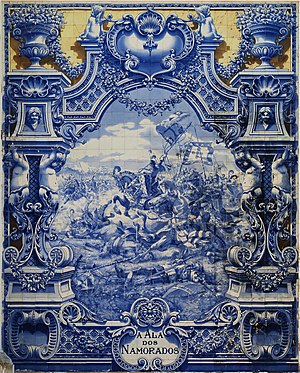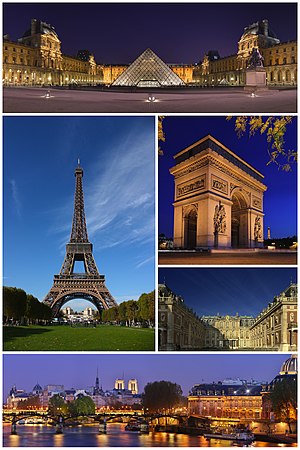Portal:Europe
| Main | Geography | Projects |
|
|
Europe is a continent located entirely in the Northern Hemisphere and mostly in the Eastern Hemisphere. It comprises the westernmost peninsulas of the continental landmass of Eurasia, and is bordered by the Arctic Ocean to the north, the Atlantic Ocean to the west, the Mediterranean Sea to the south, and Asia to the east. Europe is commonly considered to be separated from Asia by the watershed of the Ural Mountains, the Ural River, the Caspian Sea, the Greater Caucasus, the Black Sea, and the waterways of the Turkish Straits. Although much of this border is over land, Europe is generally accorded the status of a full continent because of its great physical size and the weight of history and tradition.
Europe covers about 10,180,000 km2 (3,930,000 sq mi), or 2% of the Earth's surface (6.8% of land area), making it the second smallest continent (using the seven-continent model). Politically, Europe is divided into about fifty sovereign states, of which Russia is the largest and most populous, spanning 39% of the continent and comprising 15% of its population. Europe had a total population of about 741 million (about 11% of the world population), as of 2018. The European climate is largely affected by warm Atlantic currents that temper winters and summers on much of the continent, even at latitudes along which the climate in Asia and North America is severe. Further from the sea, seasonal differences are more noticeable than close to the coast.
The history of Europe concerns itself with the discovery and collection, the study, organization and presentation and the interpretation of past events and affairs of the people of Europe since the beginning of written records. During the Neolithic era and the time of the Indo-European migrations, Europe saw human inflows from east and southeast and subsequent important cultural and material exchange. The period known as classical antiquity began with the emergence of the city-states of ancient Greece. Later, the Roman Empire came to dominate the entire Mediterranean basin. The fall of the Roman Empire in AD 476 traditionally marks the start of the Middle Ages. Beginning in the 14th century a Renaissance of knowledge challenged traditional doctrines in science and theology. Simultaneously, the Protestant Reformation set up Protestant churches primarily in Germany, Scandinavia and England. After 1800, the Industrial Revolution brought prosperity to Britain and Western Europe. The main European powers set up colonies in most of the Americas and Africa, and parts of Asia. In the 20th century, World War I and World War II resulted in massive numbers of deaths. The Cold War dominated European geo-politics from 1947 to 1989. After the fall of the Iron Curtain, the European countries grew together.
The culture of Europe is rooted in the art, architecture, film, different types of music, economic, literature, and philosophy that originated from the continent of Europe. European culture is largely rooted in what is often referred to as its "common cultural heritage".
The economy of Europe comprises more than 744 million people in 50 countries. The formation of the European Union (EU) and in 1999, the introduction of a unified currency, the Euro, brings participating European countries closer through the convenience of a shared currency and has led to a stronger European cash flow. The difference in wealth across Europe can be seen roughly in former Cold War divide, with some countries breaching the divide (Greece, Estonia, Portugal, Slovenia and the Czech Republic). Whilst most European states have a GDP per capita higher than the world's average and are very highly developed (Liechtenstein, Luxembourg, Monaco, Andorra, Norway, Sweden, Denmark, Netherlands, Switzerland, United Kingdom, Ireland, Germany), some European economies, despite their position over the world's average in the Human Development Index, are poorer.
Featured article -

The World Series of Poker Europe (WSOPE) is the first expansion effort of World Series of Poker-branded poker tournaments outside the United States. Since 1970, participants have had to travel to Las Vegas if they wanted to compete in the World Series of Poker (WSOP). Although the WSOP held circuit events in other locations, the main tournaments, which awarded bracelets to the winners, were exclusively held in Las Vegas. The inaugural WSOPE, held in 2007, marked the first time that a WSOP bracelet was awarded outside Las Vegas.
In 2004, Harrah's Casinos purchased the rights to the WSOP label. Harrah's later purchased London Clubs International (LCI). LCI operates three casinos in the London area—Fifty, Leicester Square, and The Sportsman. After the purchase of these casinos, Harrah's decided to expand its WSOP label into Europe. European casinos typically have a different environment than those in the U.S. Jeffrey Pollack, the WSOP Commissioner, indicated that the WSOPE would have a "style and flair that is both unique and appropriate to the setting. So don't be surprised if we require participants to wear blazers at the tables. If James Bond were hosting a poker tournament it may look like the World Series of Poker Europe." (Full article...)Featured location -
Weymouth (/ˈweɪməθ/ WAY-məth) is a sea-side town and civil parish in the Dorset district, in the ceremonial county of Dorset, on the English Channel coast of England. Situated on a sheltered bay at the mouth of the River Wey, 11 km (7 mi) south of the county town of Dorchester, Weymouth had a population of 53,427 in 2021. It is the third-largest settlement in Dorset after Bournemouth and Poole. The greater Weymouth urban area has a population of 72,802.
The history of the town stretches back to the 12th century and includes roles in the spread of the Black Death, the settlement of the Americas and the development of Georgian architecture. It was a major departure point for the Normandy Landings during World War II. Prior to local government reorganisation in April 2019, Weymouth formed a borough with the neighbouring Isle of Portland. Since then the area has been governed by Dorset Council. Weymouth, Portland and the Purbeck district are in the South Dorset parliamentary constituency. (Full article...)Featured portrait
 |
In the News
- 14 February 2024 – Russian invasion of Ukraine
- Crimea attacks
- Ukraine claims to have sunk the Russian ship Tsezar Kunikov off the coast of Katsiveli, Crimea. A video appears to show the vessel being struck with unmanned surface drones. (Radio Free Europe/Radio Liberty)
- 13 February 2024 – Estonia–Russia relations
- Prime Minister of Estonia, Kaja Kallas, is reportedly placed on the Russian Interior Ministry's register of wanted people due to the country's removal of Soviet War Memorials, making Kallas the first known government leader to be added to a wanted list by Russian authorities. (The Guardian)
- 12 February 2024 – Israel–Hamas war
- Israel–Netherlands relations
- A Dutch appeals court orders a suspension of exports of F-35 jet parts to Israel within the next seven days over concerns that the aircraft parts are being used to commit serious violations of international humanitarian law. Prime Minister Mark Rutte says that the government will appeal the suspension. (Reuters)
- 12 February 2024 – Israel–United Kingdom relations
- British Foreign Secretary David Cameron announces sanctions against four Israeli settlers for engaging in extremist violence towards Palestinians in the occupied-West Bank. (Al Jazeera)
Updated: 16:33, 14 February 2024
Categories
Featured biography -
Sophie Blanchard (French pronunciation: [sɔfi blɑ̃ʃaʁ]; 25 March 1778 – 6 July 1819), commonly referred to as Madame Blanchard, was a French aeronaut and the wife of ballooning pioneer Jean-Pierre Blanchard. Blanchard was the first woman to work as a professional balloonist, and after her husband's death she continued ballooning, making more than 60 ascents. Known throughout Europe for her ballooning exploits, Blanchard entertained Napoleon Bonaparte, who promoted her to the role of "Aeronaut of the Official Festivals", replacing André-Jacques Garnerin. On the restoration of the monarchy in 1814 she performed for Louis XVIII, who named her "Official Aeronaut of the Restoration".
Ballooning was a risky business for the pioneers. Blanchard lost consciousness on a few occasions, endured freezing temperatures and almost drowned when her balloon crashed in a marsh. In 1819, she became the first woman to be killed in an aviation accident when, during an exhibition in the Tivoli Gardens in Paris, she launched fireworks that ignited the gas in her balloon. Her craft crashed on the roof of a house and she fell to her death. (Full article...)Featured picture
 |
Related portals
Major Religions in Europe
Northern Europe
Western Europe
Central Europe
Eastern Europe, Balkans and Caucasus
Southern Europe
Featured panorama
 |
Topics
Associated Wikimedia
The following Wikimedia Foundation sister projects provide more on this subject:
-
Commons
Free media repository -
Wikibooks
Free textbooks and manuals -
Wikidata
Free knowledge base -
Wikinews
Free-content news -
Wikiquote
Collection of quotations -
Wikisource
Free-content library -
Wikispecies
Directory of species -
Wikiversity
Free learning tools -
Wikivoyage
Free travel guide -
Wiktionary
Dictionary and thesaurus


























